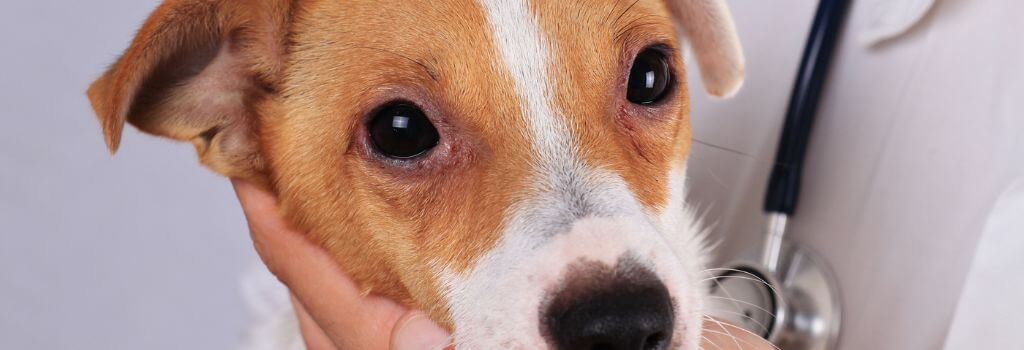Spring brings blooming flowers and warmer weather, and unfortunately, allergens can make this beautiful season challenging for our pups. As a veterinarian, I see an uptick in allergy-related visits during spring, highlighting the need for pet owners to understand and manage canine allergies effectively. Let's uncover the common triggers, symptoms, and the role of veterinary care in keeping your dog happy and healthy during allergy season.
Common Springtime Allergens for Dogs
The primary culprits behind springtime allergies in dogs include pollen from trees, grasses, and weeds, which can cause atopic dermatitis or airborne allergies. Other environmental factors such as mold, dust mites, and even the dander of people or other animals, can exacerbate your dog's allergic reactions. Understanding these triggers is the first step in providing relief for your canine companion.
More Than Just an Itch
Allergic reactions in dogs occur when their immune systems identify certain particles as dangerous, leading to an overreaction that causes inflammation and irritation in various parts of the body. This immune response can significantly affect a dog's quality of life. Skin irritation and discomfort lead to excessive scratching, biting, or licking, resulting in open wounds or infections that can further degrade their well-being.
These reactions can cause systemic discomfort, such as gastrointestinal upsets in some cases, and behavioral changes due to the constant irritation and discomfort. Chronic allergies can lead to more severe health issues like persistent ear infections, skin diseases, and even respiratory problems.
The psychological impact on dogs suffering from allergies should not be underestimated. Constant discomfort can lead to stress, anxiety, and a general decrease in their quality of life. Dogs may become less active, less interactive, and show signs of depression, which can affect the bond between pet and owner.

Signs and Symptoms to Watch For
Understanding the signs and symptoms of allergies in dogs is key to providing them with the relief they need. Dogs manifest their allergies differently than humans. While humans often experience respiratory symptoms, dogs more commonly show signs through their skin. Dogs have itchy feet, itchy skin and ears and itchy backsides.
Here’s a deeper dive into common allergic reactions and what pet owners should look out for:
- Itchy, Red, or Moist Skin: Skin irritation is one of the most apparent signs of allergies in dogs. You might notice your dog scratching incessantly, leading to red, inflamed, or even moist skin, especially around the paws, underarms, groin, or face. This constant scratching can cause further irritation or even secondary infections, making prompt veterinary care important.
- Ear Infections: Allergies often lead to ear issues in dogs. If your dog is frequently shaking their head or scratching at their ears more than usual, it might indicate an ear infection. Allergic reactions can alter the normal environment of the ear canal, leading to infections that produce a noticeable foul odor and might cause discomfort or pain to your dog.
- Sneezing and Runny Nose: Dogs can have allergic reactions that affect their respiratory systems, leading to symptoms that mirror those of humans during allergy season. Persistent sneezing, a runny nose, or even congestion can be a sign that your dog is reacting to airborne allergens.
- Watery Eyes: Allergens can irritate your dog's eyes, leading to excessive tearing. You might notice your dog’s eyes are more watery than usual, which can be their body's attempt to flush out irritants. While this is a protective response, it can also indicate that your dog is uncomfortable and in need of relief.
- Chewing on Skin: Dogs with allergies might compulsively chew on their skin, which can lead to several issues. Obsessive licking on their skin, can result in raw, exposed areas known as hot spots. These areas can quickly become infected if left untreated. If you notice your dog focusing intensely on one area of their body, it’s important to consult your veterinarian to determine the cause and appropriate treatment.
- Scooting and licking around the rectum: This is a very common issue that is noted with allergic dogs. The anal glands are scent marking glands inside the rectum which can become inflamed due to allergies. Dogs may show signs of scooting, licking around their rectum, and the gland can even abscess out through the skin. If you notice your dog scooting or licking, it is so important to consult your veterinarian to help relieve your pet’s discomfort.
The Importance of Veterinary Care
Self-diagnosing your dog's allergies and relying solely on home remedies can delay effective treatment and relief. Your veterinarian can perform allergy testing, prescribe medications that offer more targeted relief than OTC options, and recommend dietary changes or supplements that support skin health. In some cases, immunotherapy or "allergy shots" may be recommended for long-term management.

Figure It Out
In navigating the springtime allergy season with your dog, pinpointing the specific allergens causing discomfort is important. Identifying these triggers can be challenging, as dogs may react to multiple allergens simultaneously. To understand what your dog may be allergic to, observe when and where their symptoms worsen – for instance, after a walk in a particular area or during peak pollen times.
Your veterinarian can develop a specific diagnostic plan for you. This may include:
Allergy Testing
Your veterinarian may conduct allergy testing, which may include skin tests or blood tests, to identify specific environmental allergens like pollen, molds, or dust mites. This information is invaluable, as it allows for more targeted management strategies, such as avoiding certain outdoor areas during high pollen counts or implementing specific cleaning measures at home. Understanding your dog's allergy triggers is a collaborative effort between you and your veterinarian and is a critical step in providing relief and improving their quality of life during allergy season.
Food Trials
Dogs can be allergic to the ingredients in their food. This does not mean that every atopic or allergic dog is allergic to their food. Some dogs are sensitive to the protein or carbohydrate source in their food, which causes an allergic reaction where dogs will show signs of itching, licking and ear infections. Food trials are diagnostic trials. It is recommended to feed nothing but that diet for 3 months and monitor the response of the allergies. If the dog stops itching and shows a reduction in allergic signs, we conclude the dog is allergic to their food. We use a limited ingredient diet such as Hills z/d™ or Royal Canin’s Hypoallergic™ or Ultamino™ diets. These diets are produced in such a way that there is no cross contamination of other proteins or carbohydrates. Many over the counter diets may be made of salmon and rice, but they are produced on the same machine that just made chicken and rice. This allows for cross contamination and may not be diagnostic.
In person veterinary care is required not only for diagnosing and treating allergies but also for preventing secondary infections that can arise from constant scratching and skin breakdown. Your vet can also help you develop an allergy management plan tailored to your dog's specific needs, helping them enjoy the spring season with minimal discomfort.
All About Allergies
Spring allergies in dogs are manageable with the right approach and professional guidance. Being proactive about your dog's allergy symptoms and consulting with your veterinarian can make a world of difference in their comfort and quality of life. As a dedicated veterinarian, my goal is to help you and your family enjoy all seasons of the year, allergy-free. Remember, early intervention is key to preventing complications and keeping your dog healthy and happy during the allergy season.
Don't have a vet in your area yet? We can help you find a local veterinarian.
If you have more questions, the GeniusVets Teletriage platform will give you unlimited access to text and/or video calls with board-certified veterinarians! To learn more click here.
This information was first seen on Cincinnati Family Vet.


The Ultimate Guide
to Dog Care
This free guide is an indispensable manual for dog ownership. Filled with veterinary advice and recommendations on every important topic at each stage of your dog’s life, this is all the stuff that responsible dog owners need to know. That is why we are making it free!
